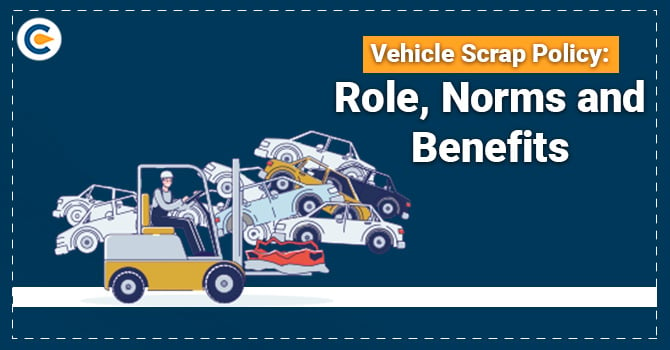In the Union Budget 2021, the Finance Minister Smt. Nirmala Sitharaman has introduced a vehicle scrap policy. This policy aims to control the nation’s pollution levels and raise the automobile industry. The guidelines apply to all automobile collection centers, dismantling centers, scrapping, recycling facilities, and recyclers. In this write-up, we will discuss the Vehicle Scrap Policy introduced by Finance Minister.
Vehicle Scrap Policy
Vehicle scrapping policy is the policy that helps in phasing out old and unfit vehicles. The policy will help encourage fuel-saving, eco-friendly vehicles, reducing vehicle pollution and oil import bills. As per the policy, the Vehicles would go through fitness tests in self-operating fitness centers in the case of personal vehicles after 20 years and commercial vehicles after 15 years. The Motor Vehicles (Registration and Functions of Vehicle Scrapping Facility) Rules, 2021 draft was prepared to establish the Registered Vehicle Scrapping Facility and regulate automobile collection, scrapping, recycling centers, and dismantling automobiles, etc.
The Proposal-Vehicle Scrap Policy
The Vehicle Scrap Policy is formed with the objective-
- To reduce the ill-equipped vehicles to bring down the vehicle pollution,
- To meet the climate commitments,
- Improve road safety and fuel efficiency,
- Formalize informal vehicle scrapping industry and
- To recover low-cost materials for the automotive, steel, and electronics industry.
- Anticipates to spin jobs and attract investment as well.
- Also, as per the policy, the state government is advised to reduce 25 % road tax for personal vehicles and 15 % for commercial vehicles and registration fees.
- Also, the vehicle manufacturers have been advised to provide a 5 % discount on the purchase of new vehicles against scrapping certificates.
Criteria-Vehicle Scrap Policy
- Actual owners to deliver such vehicles to a Registered Vehicle Scrapping Facility with a Certificate of the cars, registration certificate, their PAN details, and other requisite documents.
- Scrapper to verify data of the vehicles from a record of the Stolen vehicles and issuance of Certificate of Deposit, mandatory for the owner to avail incentives
- The Certificate, once utilized, will be stamped “Cancelled” by the agency.
- Authority will make a record of the vehicles scrapped every year.
- A Vehicle of more than 20 years, if found ill-equipped or non-renewal of registration certificate will be De-registered.
Benefits of Vehicle Scrap Policy-
The Vehicle Scrap policy will make India an auto hub in the coming future with automated testing centers and registered vehicle scrapping facilities across the country. Vehicle Scrap Policy was introduced with a view to-.
Forming Scrap garage: This policy has resulted in more scrap yards in India and effective recovery from old vehicles.
Creation of Employment: With Vehicle Scrap Policy, new fitness centers will get established, where approx. Thirty-five thousand people will get employment.
Increased Revenue: The policy will help enhance heavy and medium-sized commercial vehicles sales. By this, the government treasury is looking forward to getting approx—Rs 30,000 to 40,000 crores of money through Goods and Services Tax.
A decline in auto components price: By implementing such policies, the price of auto components would fall substantially. The cost of auto components would fall with the recycling of metal and plastic parts. This will result in a reduction in the price of scrapped materials and the production cost of the vehicle manufacturers.
Pollution Control– The policy will help improve fuel energy and pollution control as old vehicles pollute the environment 10 to 12 times more.
Facts- As per the facts, approximately 17 lakh medium and heavy commercial vehicles are more than 15 years old.
Mandatory Compliances as per the Vehicle Scrap Policy-
- The criteria to determine vehicle fitness will primarily be emission tests, acceleration, safety equipment, and many other tests, which are as per the Central Motor Vehicle Rules, 1989[1].
- Applicability of Rules for fitness tests and scrapping centers from October 1, 2021, while scrapping of government and Public Sector Unit vehicles older than 15 years to come into effect from April 1, 2022.
- From April 1, 2023, mandatory fitness testing will be in force for heavy commercial vehicles, and the same is required continuously for other categories from June 1, 2024.
- The fees for fitness certificate to be enhanced and test to be applicable for commercial vehicles after 15 years from its date of initial registration. However, in case of failure to get the fitness certificate, such cars will be de-registered.
- Applicability of increased registration fee for private vehicles after 20 years from its initial registration. However, in case of failure to get the fitness certificate or non-renewal of Certificate, such cars will be de-registered.
- In case of failure of the fitness test or to get a renewal of its registration certificate, it is to be declared as ‘End of Life Vehicle.’
Conclusion
The Vehicle Scrap policy is crucial, correctly predicted, and will support the automobile industry. Also, it will help this sector create profitability for all. The framework will provide more significant investments, remarkably cut back the raw material cost, and support the recreation of sheet metal recycling. Also, the policy will help provide the right platform in generating employment in the auto accessory and making the sector more organized.
In various ways, the Vehicle Scrap policy plays a significant role in the developmental landmark of the Indian auto industry as it is an inspiring call for start-ups.
Read our Article:RVSF (Registered Vehicle Scrapping Facility): How to set it up?











